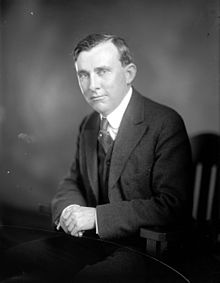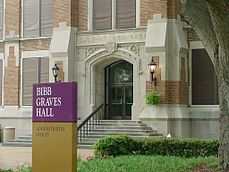- Bibb Graves
-
David Bibb Graves 
David Bibb Graves 38th Governor of Alabama In office
January 17, 1927 – January 19, 1931Lieutenant William C. Davis Preceded by William W. Brandon Succeeded by Benjamin M. Miller In office
January 14, 1935 – January 17, 1939Lieutenant Thomas E. Knight Preceded by Benjamin M. Miller Succeeded by Frank M. Dixon Personal details Born April 1, 1873
Hope Hull, AlabamaDied March 14, 1942 (aged 68)
Sarasota, FloridaResting place Greenwood Cemetery Political party Democratic Spouse(s) Dixie Bibb Graves Alma mater University of Alabama,
Yale Law SchoolProfession Teacher, lawyer Religion Christian Military service Service/branch United States Army Battles/wars World War I David Bibb Graves (April 1, 1873–March 14, 1942) was a Democratic politician and the 38th Governor of Alabama 1927-1931 and 1935–1939, the first Alabama governor to serve two four-year terms.
Contents
Early life
Graves was born in Hope Hull, Alabama, son of David and Mattie Bibb Graves and a descendant of Alabama's first governor William Wyatt Bibb. Graves' father died when he was one year old, and he was reared first by his paternal grandfather on an Alabama farm and then by an uncle in Texas. Bibb attended the University of Alabama, where he was a member of the school's inaugural football team. After graduating with a degree in civil engineering (1893), Graves earned a degree from Yale Law School (1896). Graves was elected to the Alabama legislature and later served as the city attorney in Montgomery.
As adjutant general of the Alabama National Guard, he helped organize the 1st Alabama Cavalry and served on the Mexican border in 1916. In World War I, Graves commanded as a colonel the 117th U.S. Field Artillery in France, and upon his return to Alabama, he helped organize the state section of the American Legion.
Political life
 Bibb Graves Hall, the main administrative building at the University of North Alabama in Florence. Bibb Graves Hall is one of many public buildings in Alabama named after Graves, known as the “education governor.”
Bibb Graves Hall, the main administrative building at the University of North Alabama in Florence. Bibb Graves Hall is one of many public buildings in Alabama named after Graves, known as the “education governor.”
Graves lost his first campaign for governor in 1922, but four years later, with the secret endorsement of the Ku Klux Klan, he was elected to his first term as governor. Almost certainly Graves was the Exalted Cyclops (chapter president) of the Montgomery chapter of the Klan, but both Graves and U.S. Supreme Court Justice Hugo Black, another Alabama Klan member, were more opportunists than ideologues, politicians who used the temporary strength of the Klan to further their careers.[1]
As governor, Graves earned a reputation as reformer, abolishing the convict leasing system and raising taxes on public utilities, railroads, and coal and iron companies. The new revenue was used to expand educational and public health facilities, increase teachers' salaries and veterans' pensions, fund an ambitious road-building program, and improve port facilities in Mobile. "To maintain his popularity among the farmers in northern Alabama and the working classes, Graves made good on his commitment to New Deal legislation, winning a reputation as one of the most progressive governors in the South."[2] During his second gubernatorial administration he supported Franklin D. Roosevelt's “court packing” plan and Hugo Black's nomination to the U.S. Supreme Court. In 1937, when Black's ties to the Klan were debated in Congress, Graves noted his own previous membership as well, a membership that had been publicly revealed when he resigned from the organization in 1928.[3]
Graves made many successful trips to Washington to secure funds for Alabama, which he called "plum-tree-shaking expeditions," and President Roosevelt appointed him to a national advisory committee on agriculture and to an interregional highway committee. Graves was a strong opponent of eugenic sterilization, and by 1938, he was on hand to greet the 1,200 delegates to the founding session of the Southern Conference on Human Welfare—a fifth of whom were black.[4]
In 1937, when President Franklin Roosevelt named Senator Hugo Black to the U.S. Supreme Court, Graves appointed his own wife, Dixie Bibb Graves, to serve the remainder of Black's term. She thus became Alabama's first woman Senator.
Personal life
Graves was a member of Phi Beta Kappa and an elder of the Christian Church. He was a founding member of the board of trustees of Bob Jones College (now Bob Jones University) and a personal friend of the founder, evangelist Bob Jones, Sr. Bibb Graves died in Sarasota, Florida while preparing for another gubernatorial campaign.
Legacy
The University of West Alabama has a Bibb Graves Hall and a Bibb Graves Auditorium, the University of North Alabama has a Bibb Graves Hall, Auburn University has both a Bibb Graves Amphitheatre and a Bibb Graves Drive, the School of Education at the University of Alabama is named for him, and the oldest classroom building at Troy University that houses the Sorrell College of Business is named Bibb Graves Hall. The historically black Alabama A&M University has a Bibb Graves Hall, and the historically black Alabama State University has women's dormitory named Bibb Graves Hall. Jacksonville State University also has an administrative building named Bibb Graves Hall. Bob Jones University had a residence hall named for Graves until 2011, when it was renamed H. A. Ironside.[5] Bibb Graves High School in Millerville, (Clay County), Alabama closed in 2003.
Footnotes
- ^ Glenn Feldman,Politics, Society and the Klan in Alabama, 1915-1949 (Tuscaloosa: University of Alabama Press, 1999); Rice, 138.
- ^ Dictionary of American Biography (Supplement 3: 318, 1973)
- ^ John Craig Stewart, The Governors of Alabama (Gretna: Pelican Publishing Company, 1975), 177. Steward notes that although Graves "prompted his law enforcement agencies to crush violence and lawlessness wherever it was encountered," he "never took the leadership" in the fight against the Klan.
- ^ Harry S. Ashmore, Civil Rights and Wrongs (Columbia: University of South Carolina Press, 1997)
- ^ BJU website.
References
- Dictionary of American Biography (Supplement 3: 317-18, 1973)
- William E. Gilbert, "Bibb Graves as a Progressive, 1927-1930," Alabama Review 10 (1957), 15-30.
- New York Times, March 15, 1942, 43.
- Arnold S. Rice, The Ku Klux Klan in American Politics (Washington: Public Affairs Press, 1962)
External links
- "David Bibb Graves". Find a Grave. http://www.findagrave.com/cgi-bin/fg.cgi?page=gr&GRid=6921983. Retrieved August 11, 2010.
Political offices Preceded by
William W. BrandonGovernor of Alabama
1927—1931Succeeded by
Benjamin M. MillerPreceded by
Benjamin M. MillerGovernor of Alabama
1935—1939Succeeded by
Frank M. DixonGovernors and Lieutenant Governors of Alabama Governors W. Bibb · T. Bibb · Pickens · Murphy · G. Moore · S. Moore · Gayle · Clay · McVay · Bagby · Fitzpatrick · Martin · Chapman · Collier · Winston · A. Moore · Shorter · Watts · Parsons · Patton · Swayne · Smith · Lindsay · Lewis · Houston · Cobb · E. A. O'Neal · Seay · T. Jones · Oates · Johnston · Samford · Jelks · Comer · E. O'Neal · Henderson · Kilby · Brandon · Graves · Miller · Graves · Dixon · Sparks · Folsom Sr. · Persons · Folsom Sr. · Patterson · G. Wallace · L. Wallace · Brewer · G. Wallace · James · G. Wallace · Hunt · Folsom Jr. · James · Siegelman · Riley · Bentley
Lieutenant
GovernorsCategories:- 1873 births
- 1942 deaths
- Alabama lawyers
- Alabama Crimson Tide football players
- People from Montgomery, Alabama
- Governors of Alabama
- Ku Klux Klan members
- University of Alabama alumni
- Yale Law School alumni
- American military personnel of World War I
Wikimedia Foundation. 2010.
